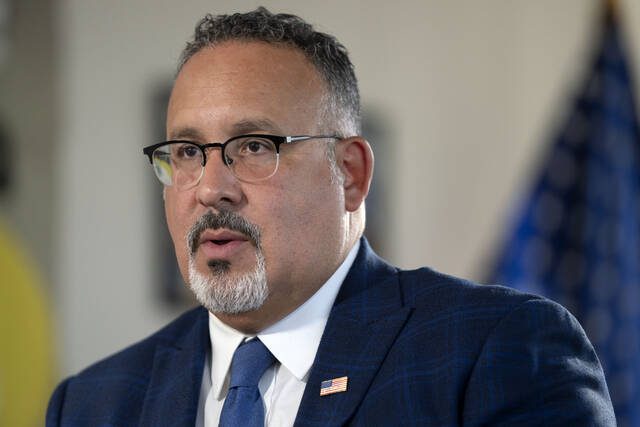The U.S. Education Department announced that a mistake in the calculation of financial aid applications for hundreds of thousands of students has been found and needs to be redone. This error is one in a series of others and may cause additional delays in college applications this year.
The federal government's vendor made an incorrect calculation for over 200,000 students' financial aid, which was sent to colleges to help prepare financial aid offers. Now, this information must be recalculated, while the department is still dealing with a backlog of over 4 million other financial aid applications.
The Education Department stated that 1.3 million applications processed accurately and sent to colleges this month will not be affected by the issue. They have fixed the error and assured that it will not impact future records.
It's unlikely that many, if any, students have received financial aid offers based on the incorrect information, as the department started sending records only in the last two weeks. Colleges usually take several weeks to put together financial aid packages once they receive this information.
This year, students applying for college have been in a state of uncertainty as they wait for the Education Department to update the Free Application for Federal Student Aid (FAFSA). FAFSA is used to determine eligibility for federal Pell Grants, and colleges and states use it to award their own financial aid.
The update to simplify the form took longer than expected, leaving colleges with less time to make financial aid offers and giving students less time to decide where to enroll.
Justin Draeger, president and CEO of the National Association of Student Financial Aid Administrators, expressed concern about the likely delays this error will cause for students.
Draeger added that after many delays, every error will significantly affect students relying on need-based financial aid to pursue their higher education goals.
The latest mistake is related to the Student Aid Index, a new formula used to determine students’ financial need after they submit the FAFSA application. For some students, certain financial assets like investments, savings, and total cash were not taken into account, resulting in a lower Student Aid Index that misrepresents their actual financial need.
While the department corrects those students' records, it recommends that colleges make their own calculations and prepare a tentative aid package.
However, Draeger opposed this idea, stating that colleges can only work with accurate and valid data.
He believes that it's not practical to send incorrect FAFSA data and expect thousands of schools to make real-time calculations and adjustments to the federal formula.
Supporters are worried that the disorganization of this year’s procedure could discourage students from attending college, especially those for whom money is an important factor in the decision.
Republicans in the Senate want to have a meeting with Education Secretary Miguel Cardona to talk about their significant worries regarding the FAFSA rollout.
The famously time-consuming FAFSA form was supposed to be improved in 2020 through a law in Congress supported by both parties. The law pledged to simplify the form, reducing the number of questions from 100 to less than 40, and also changed the basis for student aid, aiming to expand it to more low-income students.
However, the update has been affected by delays and technical problems.
Normally, the form is available to complete in October, but the Education Department didn't have it prepared until late December. Even then, the agency wasn't ready to start processing the forms and sending them to states and colleges, which only began this month.
During this process, the department has worked quickly to fix numerous faults. Initially, the process failed to correctly consider inflation. Another problem prevented parents without a Social Security number from completing the form, which meant many U.S. citizen or permanent resident students with non-citizen parents could not apply.
The department claims that those issues have been resolved and is now hurrying to process millions of student applications and send them to colleges and states. The agency reports that it has processed 1.5 million applications out of about 6 million received so far.
The department's statement says it will continue to send large amounts of records in the next few weeks. It states, “We are concentrating on assisting students and families through this process and helping colleges provide aid offers as fast as possible.”
WASHINGTON — The U.S. Education Department stated that it has found a calculation mistake in hundreds of thousands of student financial aid applications sent to colleges this month and will need to reprocess them. This oversight comes after a series of other mistakes and poses the risk of further delays for this year’s college applications.



